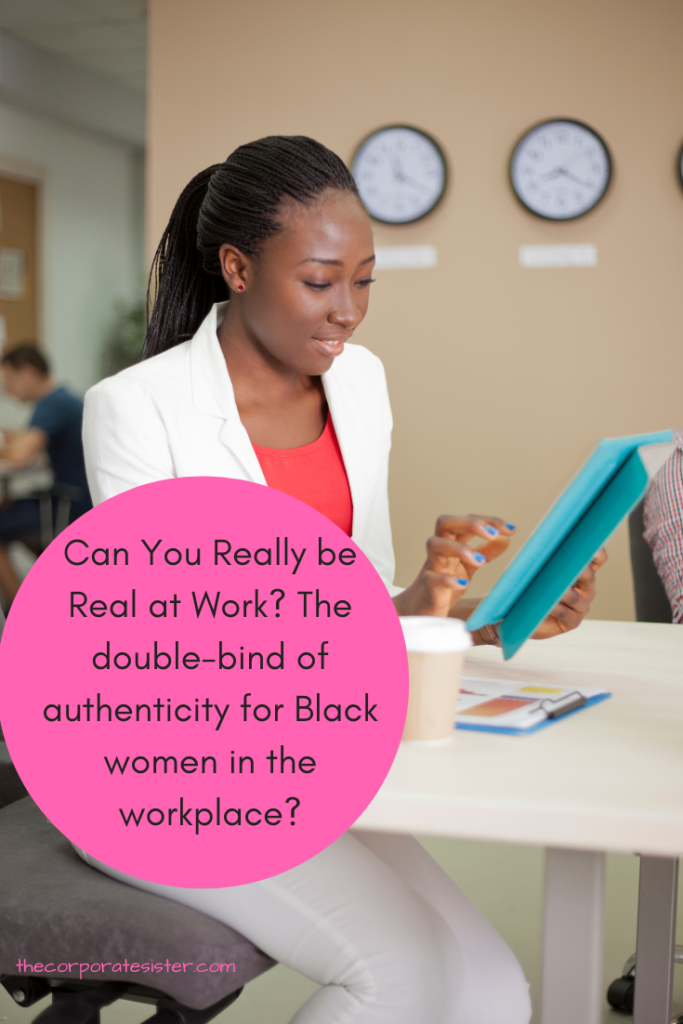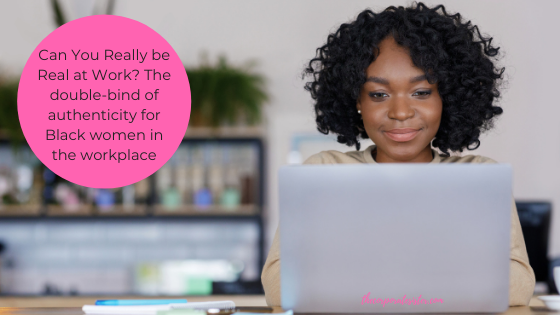Authenticity has become quite the buzzword lately. So much revolves around being more authentic, showing up as your “real” self, being more “real”…All you have to do is pop open any social media platform, from Instagram to Facebook, to come face-to-face with some deep, or deeply funny, quote or meme about being more authentic and less “fake”…Needless to say, if you struggle with uncertainty or doubts about your authentic self, this is bound to make you slightly uncomfortable. Even worse, if you happen to be a Black working woman dealing with the double-bind of authenticity in and outside of the workplace, it’s bound to make you stir in place, and possibly tighten your chest a bit. Being “real” is all good and well most of the time, but can you really be “real” at work as a Black professional woman?
I distinctively remember my very first week at my very first “real” job, as a freshly minted new graduate with fresh new credentials, new shoes and a new Ann Taylor blouse (I couldn’t afford the whole suit just yet). While all the new freshly minted recruits introduced themselves, sharing personal stories about their families, dogs and where they were from, I was racking my brain trying to figure out what I would and would not share. I was one of a few Black women in the room. I was born in a beautiful place that happened to be across the Atlantic Ocean. And my name not exactly Jane or John. I was different. And I didn’t know whether I could really be real at work…

If you’re reading this and nodding your head because you went through a similar experience, then you know how challenging being authentic in the workplace can be. Despite it being touted as the ultimate thing to be, it doesn’t come easy for many minorities, especially for Black women at work.
Related: The Authenticity Struggle: How to beat the fear of being your own woman
According to the 2020 Mc Kinsey Women in the Workplace report, women of color, especially Black women, have been consistently underrepresented in senior management for the sixth year in a row for reasons other than attrition alone. They also face more challenges as they make their way up the corporate ladder, lagging behind for reasons such as lack of support and access to senior leadership, as well as other factors. After Xerox’s ex-CEO Ursula Burns’ exit, Rosalind Brewer is now the only Black woman currently heading a Fortune 500 company in the United States, after taking on the position of Chief Executive Officer (CEO) at Walgreens Boots Alliance (WBA) on March 15, 2021. Even still, Brewer is only the third Black woman to serve as CEO of a Fortune 500 company.
Authentic leadership theory argues when organizational leaders are aware of and act upon their true beliefs, values and strengths, while helping others do the same, they also contribute to higher well-being levels and increased employee performance. While authenticity is hailed as a significant business advantage, contributing to employee well-beingthrough increased job satisfaction, decreased work stress, and stress symptoms, and spurring innovation and creativity,its benefits still largely elude Black women at work. As a matter of fact, sociological research demonstrates tensions between what authenticity truly means in terms of the true self, and social constructions of black authenticity, leading to a “hybridized black authenticity”. As such, Black women are faced with having to juggle multiple ideals of authenticity, struggling with combining “raceless’ and race-specific expectations. Quite the juggle, if you ask me…
So can you really be real at work as a Black woman? It’s a loaded question, and one that begs further exploration at both the personal and organizational level. Above all, what is crucial here is to understand that authenticity for Black women at work is not just a matter of showing up as you are, or even bringing your whole self to work. It’s a matter of walking the tightrope of a hybrid concept and understanding of authenticity that requires us to constantly toggle between what it means to be oneself, and what it means to be a Black woman. Or at least what society has constructed in both scenarios…
Can you really be real as a Black woman at work? Let us know your insights and share your stories in the comments or by emailing us at corporate@thecorporatesister.com!
The Corporate Sister.







